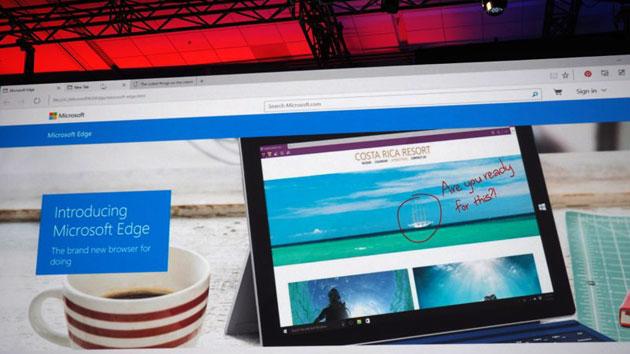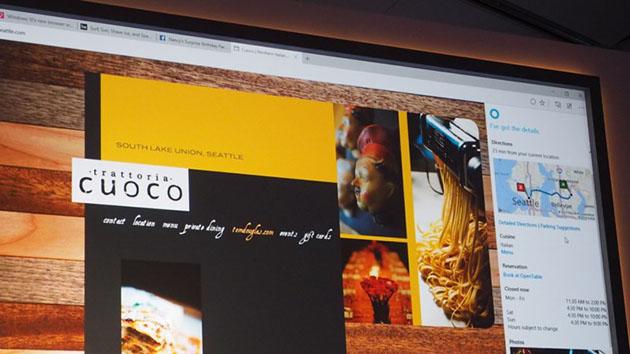projectspartan
Latest

EFF is building a stronger 'Do Not Track' browser setting
Despite "Do Not Track" being a standard option on Firefox, Chrome and Safari (but not Microsoft Edge), many unscrupulous advertisers are still secretly tracking the browsing habits of internet users. That's why the Electronic Frontier Foundation has teamed with Adblock, Medium, Mixpanel and DuckDuckGo to create a stronger standard.

Windows 10's web browser is called Microsoft Edge
After months of waiting, Microsoft finally has a proper name for Windows 10's brand-new web browser: Forget Project Spartan, and meet Microsoft Edge. It still has the same flat, minimalist look you saw at the start of the year, as well as clever features like Cortana voice commands and annotation for websites. You'll also get a new tab page that shows both other websites as well as handy info like weather, and Microsoft is now making it easier for developers to port extensions from other browsers (such as Chrome). Yes, the folks in Redmond are largely using the Edge name to distance their latest browser from Internet Explorer's less-than-stellar reputation, but you have to admit that the new branding is decidedly catchier.

Microsoft's new browser hits phones in latest Windows 10 preview
If you've been itchin' to take a look at the mobile version of Microsoft's new browser, now is your chance. The latest Windows 10 Technical Preview is available for phones, delivering Project Spartan and early looks at both its Reading List and Reading View features. As promised, the folks in Redmond also included Outlook Mail and Outlook Calendar apps this time around -- both of which are now the default options for the mobile version of Windows. New Phone and Messaging apps are here as well, as is retooled software for Maps, People (contacts) and an updated App Switcher. Nearly all of the additions sport the redesigned UI that Microsoft has been showing off since Windows 10 was announced back in January.

Microsoft's new browser won't enable 'Do Not Track' by default
Microsoft admits that when it switched on "do not track" by default in Internet Explorer 10 back in 2012, it was "welcomed by many." However, the company now has to switch it off to comply with the latest industry standard. The newest World Wide Web Consortium (W3C) draft for the feature says it "MUST reflect the user's preference," meaning you have to turn it on to activate it, just like on Firefox or Chrome. Redmond explains that it has no choice but to change the default, else advertisers can argue that it doesn't have to honor any DNT signal from Microsoft's browser.

Try Microsoft's new browser in Windows 10's latest test release
If you've been wondering when Microsoft would finally roll its brand new Project Spartan web browser into a version of Windows 10 you can try, wonder no longer. The Redmond crew has released a preview build of the operating system (10049) that includes Spartan, so you can check out Cortana voice commands, annotation features and speedier rendering for yourself. The software is still rough around the edges and won't have every feature due when Windows 10 ships this summer, but you can give it a shot today if you simply can't wait to kick Internet Explorer to the curb.

Microsoft's new browser previewed in video
It was back in January that Microsoft showed off its long-awaited replacement for Internet Explorer, currently named "Project Spartan." The new browser is designed to be light, nimble and secure, with the company stressing how deeply Cortana, Microsoft's virtual assistant, is baked into the software. Now, thanks to WinBeta, we've gotten the first sense of how that'll work out in the real world. For instance, visit the homepage of a restaurant and the blue circle in the address bar will bounce to advise you that more information is available. In addition, you can highlight and right-click a word to define it, and typing in keywords in the address bar -- such as weather -- will bring up relevant information. The video is short, but you can expect plenty more like that when the previews of Windows 10 (with Spartan) arrive at the end of the month.

Screenshots of Facebook's Project Spartan on iPhone
Project Spartan, an HTML5-based version of Facebook, continues to move forward, according to a leak from TechCrunch. Screenshots of the web app and some inside information from the developers working on the project reveal a content-rich platform for mobile devices. The new UI modifies the current mobile Facebook site and adds in support for Games and Apps, which one developer says is working surprisingly well. The HMTL5 platform is expected to be completed by July 15th and introduced sometime between then and August 1st. An earlier rumor suggested Spartan was Facebook's way of moving its App (and Facebook apps like Farmville) out from under the control of Apple. Facebook, though, is reportedly telling developers that it's not targeting Apple and its App Store with this plan. Project Spartan is reportedly part of Facebook's larger overall mobile strategy to easily expand its influence to other mobile platforms. Despite these assurances, developers claim the underlying code is geared towards mobile Safari for the iPhone and iPad. Apple App Store rival or a new mobile strategy? We'll have to wait and see what happens when Facebook takes the wraps off this project in the near future.

Is Facebook's Project Spartan going after Apple's app lock?
Facebook was apparently spurned by Apple in favor of Twitter for close integration in iOS 5, but the social networking giant is now moving ahead with plans to bypass the App Store with an upcoming HTML5 web app aimed at Mobile Safari -- Project Spartan. This not-so-secret project has been making the rounds on Twitter, and is apparently aimed at breaking Apple's lock on app distribution through the App Store. Apple can't control what sites are visited by iOS users, so Facebook is looking at Project Spartan as a way to grab a piece of the app pie from Cupertino. Facebook is reportedly working with 80 outside developers, including Zynga (Farmville, Hanging With Friends) and the Huffington Post (owned by our parent company, AOL), on a variety of apps. TechCrunch (also an AOL property) blogger MG Siegler had a hands-on look at Project Spartan, and described how app purchasing would work: "Imagine loading up the mobile web version of Facebook and finding a drop-down for a new type of app. Clicking on one of the apps loads it (from whatever server it's on depending on the app-maker), and immediately a Facebook wrapper is brought in to surround the app. This wrapper will give the app some basic Facebook functionality, as well as the ability to use key Facebook elements - like Credits." Credits is Facebook's in-house payment system, akin to the payment system Apple uses for app, music and e-book purchases. By making the purchase of HTML5 games, news readers and other apps available through a separate purchasing mechanism, Facebook hopes to profit from the almost 100 million mobile users who are part of the Facebook family. Siegler notes that while Project Spartan is meant to attack Apple on one front, it also has the opportunity to help Apple in another way. By demonstrating the ability of developers to create compelling content in HTML5, Facebook hopes to pry those devs from Adobe's Flash technology, which is something that Apple would dearly love to see. Project Spartan is expected to roll out for Mobile Safari users in the next few weeks, and it should be interesting to see how Apple responds to this infringement on its turf.






